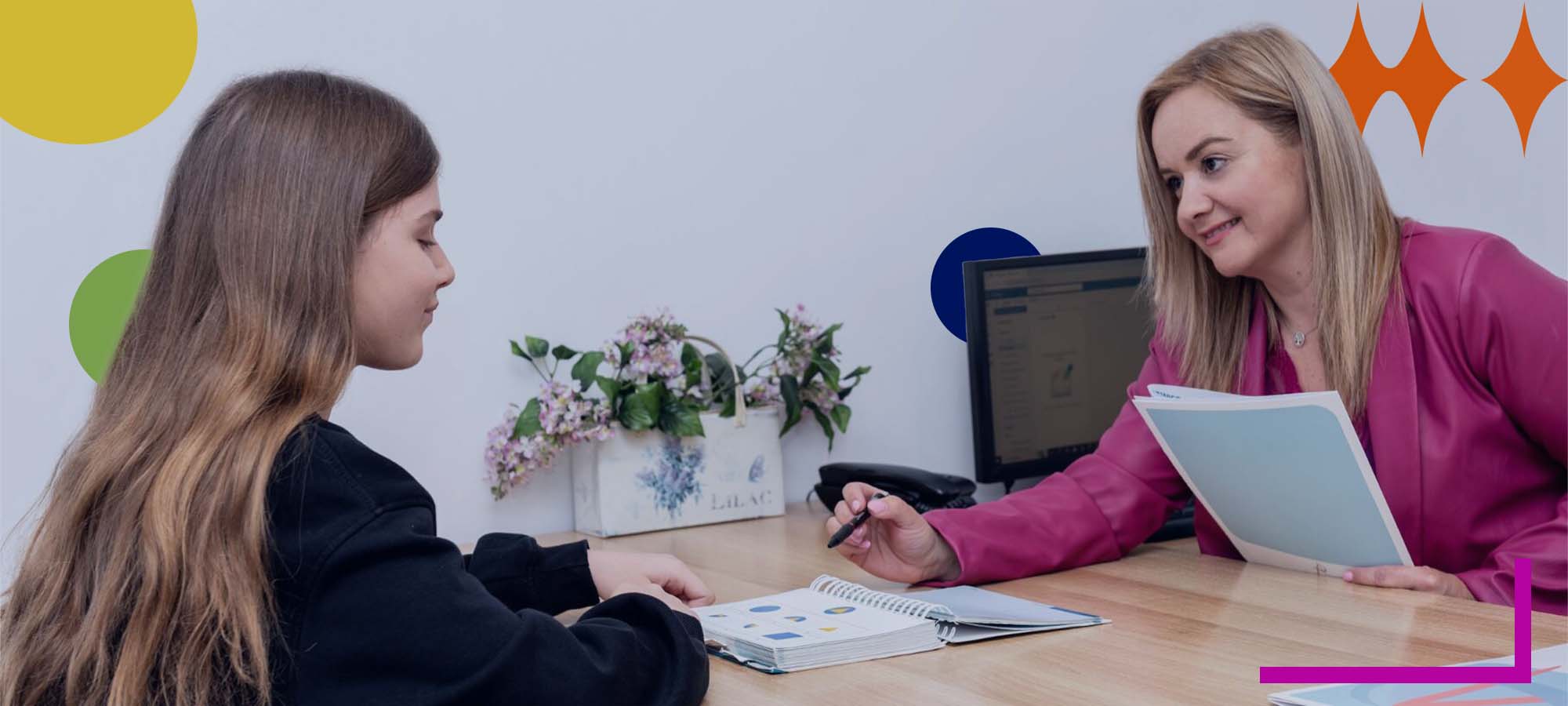
Councelling
Knowledge and Emotion
in Interaction!
Welcome to the Interdisciplinary Counseling Center "RODION Anadrasis" of the "RODION PEDIA" Schools.
Here, harmonious development and genuine interest in the child are at the core of our philosophy. We recognize the uniqueness of each child and create an environment that encourages empowerment and personal growth.
Our experienced interdisciplinary team includes psychologists, educators, and special educators. We collaborate with child psychiatry specialists, speech therapists, and occupational therapists, offering a holistic counseling program designed to support and empower our students at every step of their educational journey, from preschool age to adulthood.
The Counseling Center is located at the heart of the Schools, providing students with early support and psychoeducation, fostering their comprehensive development. At the same time, it offers parents and educators the tools and expertise to contribute in the best possible way.
Among the primary goals of the specialized services offered by the Interdisciplinary Counseling Center are emotional education, the cultivation of empathy, the development of social and communication skills, and the psychological resilience of children as additional assets in their education.
Στο Διεπιστημονικό Κέντρο «ΡΟΔΙΩΝ Ανάδρασις», διαθέτουμε μια από τις πιο ενημερωμένες εργαλειοθήκες και παρέχουμε εξειδικευμένα διαγνωστικά τεστ για την ακριβή αξιολόγηση και κατανόηση των συναισθηματικών, μαθησιακών και γνωστικών αναγκών των παιδιών.
Using validated psychometric tools, we offer a comprehensive view of the students' abilities and the areas that require strengthening, thus supporting individual progress and development.

Psychologist & Director of the Interdisciplinary Counseling Center
"RODION Anadrasis"




Child and Adolescent Counseling
At our center, we offer a holistic approach to counseling children and adolescents, focusing on both support and the development of individual and social skills.
With techniques that enhance self-confidence, personality development, goal setting, and managing negative emotions, we empower and encourage students to face challenges and solve problems confidently.
Our goal is for the counseling process to serve as a bridge to a more balanced and happy life for children and adolescents.
Parent Counseling
The parent counseling provided at our center is designed to support, guide, and empower parents in recognizing and addressing the challenges and difficulties their child may face.
Through a collaborative and well-considered approach, we work together to improve the psychological and emotional well-being of children, enhancing familial harmony.


"Parent Education" Program
The "Parent Education" program is an innovative initiative aimed at supporting parents. Through this specialized seminar program, parents gain the tools to become more effective in their role, strengthening family unity and contributing to the harmonious development of their children.
In "Parent Education," parents learn how to develop effective parenting strategies, enhance communication with their children, and manage any conflicts that may arise. Additionally, the program focuses on developing parents' self-awareness, helping them better understand their reactions and emotions, and how these affect their children's upbringing.
The workshops are conducted in small groups, allowing for a personal approach and the direct exchange of views and experiences among parents. Participants have the opportunity to explore and delve into topics such as proper upbringing, family dynamics, supporting learning at home, and fostering children's independence and self-esteem.
Learning Assessment
For Kindergarten children, we conduct a School Readiness Assessment. Through the learning assessment of students at every level and the implementation of targeted intervention programs, we prepare children for a successful educational journey.
Our approach focuses on early diagnosis and effective management of learning difficulties, creating a fertile learning environment.
We help students discover how they perceive and process cognitive information and adopt personalized study techniques based on their learning profile, replacing time-consuming, ineffective, and strenuous study methods.
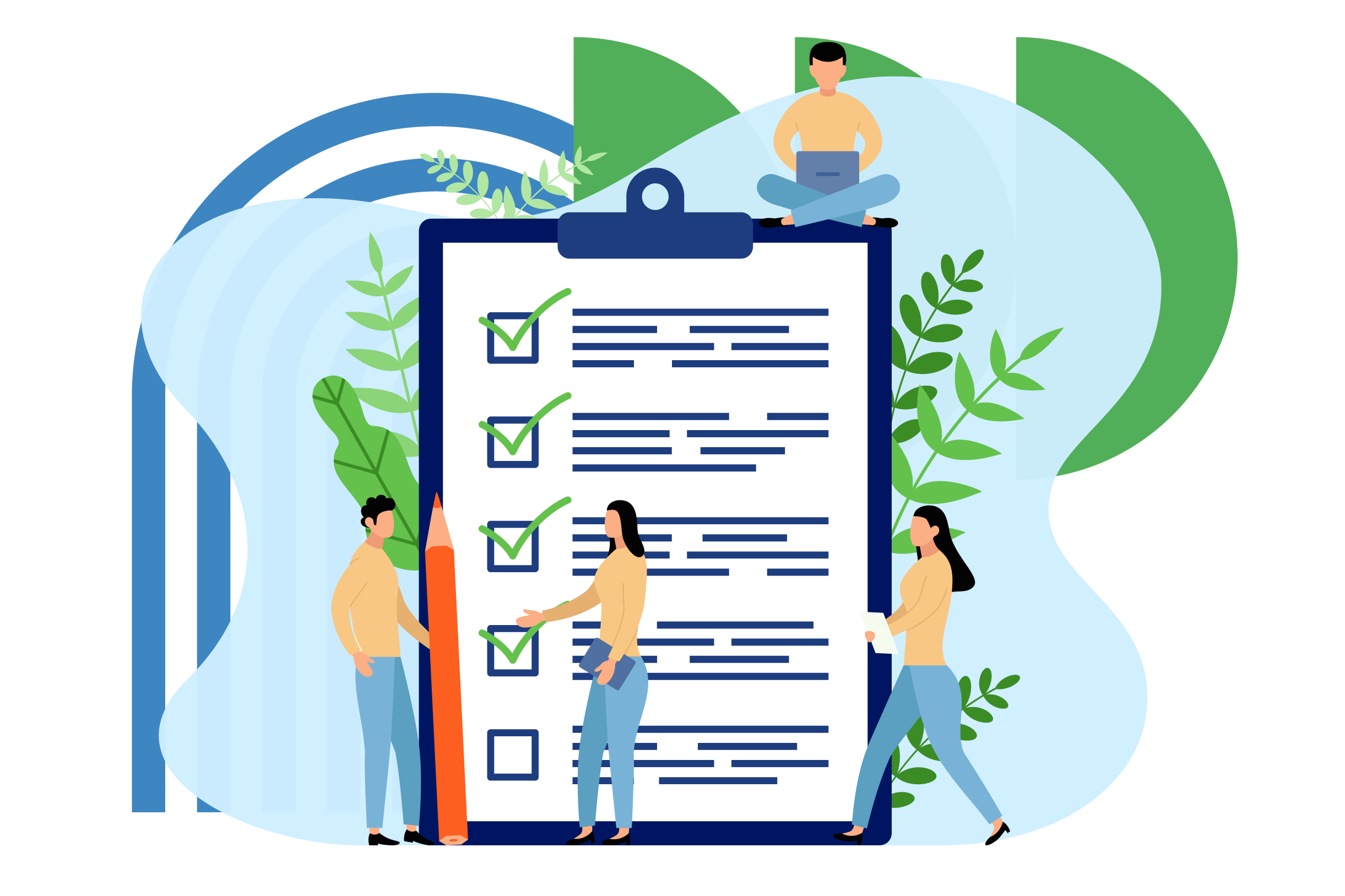

Individualized Intervention and Student Support
Gifted children and those with learning difficulties have the opportunity to receive a study program tailored to their abilities and needs.
Through detailed psychopedagogical assessments, we develop individualized intervention programs for children with:
Career Guidance
At our center, we offer comprehensive Career Counseling and Vocational Guidance services designed to guide students over 15 years old in discovering suitable career options.
The goal of the process is to explore the personality, inclinations, abilities, skills, and interests of each individual through an innovative "experiential system," and to suggest specific professions that align with the individual's personality. Additionally, the corresponding higher education departments are identified, along with the degree to which each aligns with the individual’s personality factors (primary and secondary).
Through the administration of advanced career tests (ARISTON Candidates and ARISTON Adults), our certified counselors provide tailored guidance and specialized counseling. At the end of the process, each individual receives a detailed professional profile report.

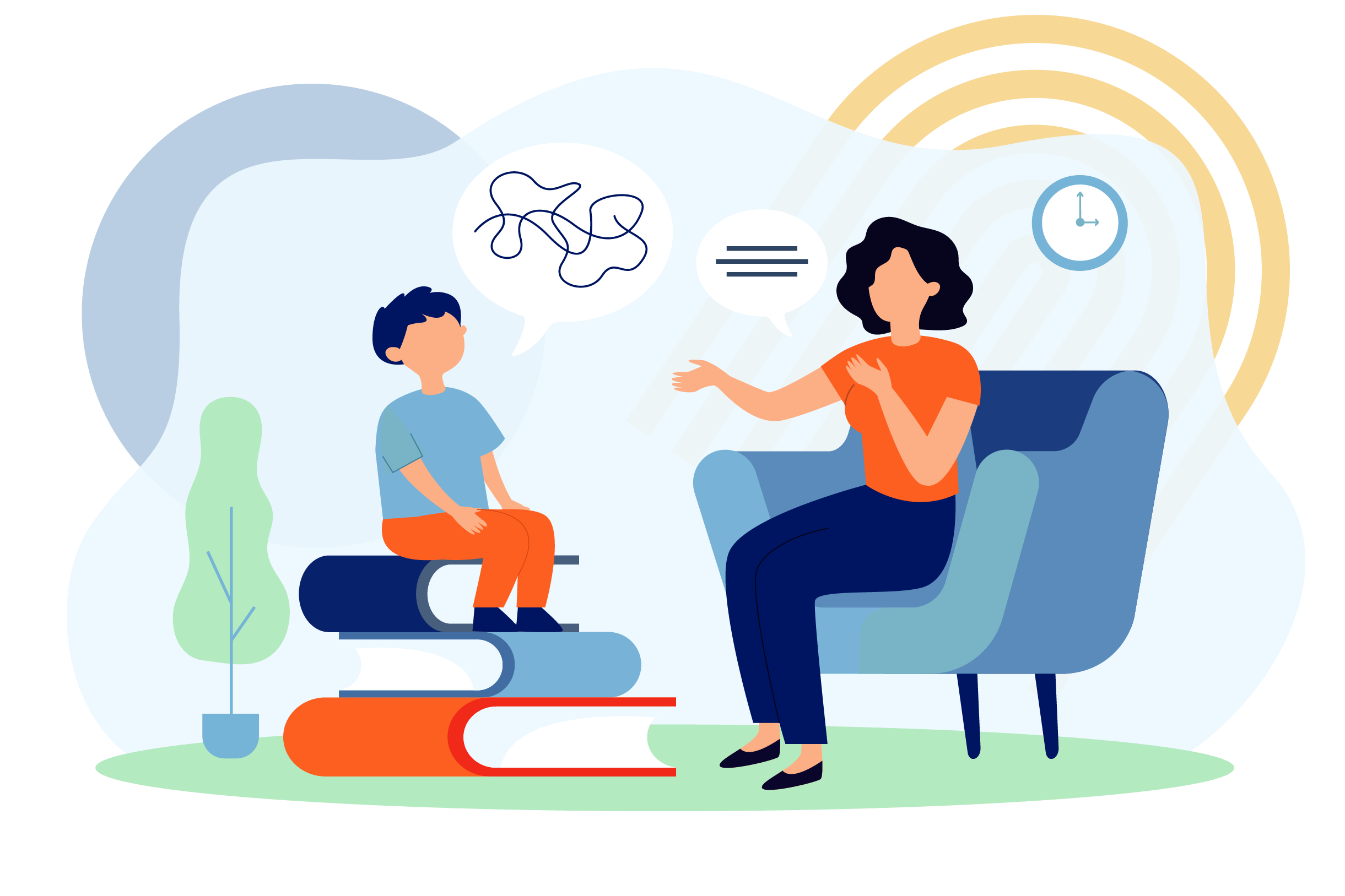
"3+" Program
The school, after the family, is an important place for the upbringing of children, where they develop their personal and social skills. The systematic implementation of prevention programs in our school equips students with "life skills" and significantly contributes to shaping attitudes and behaviors that promote physical and mental health.
Through prevention programs, we strengthen the bonds between children, educators, and parents, improve the psychological and social climate in the classroom, and thereby increase children's satisfaction with the school.
With the innovative "3+" Program, which includes students from 5th grade to 11th grade, we integrate experiential actions and psychoeducational workshops into the school program, promoting the development of empathy and emotional education. We also apply methods for preventing and addressing negative school phenomena, such as bullying, with the aim of creating a safe and supportive environment for everyone.
Mediation as an educational tool is one of the most modern and necessary additions to our school's pedagogical dynamics. In a rapidly changing world, the ability to mediate, communicate effectively, and resolve conflicts peacefully is more important than ever.
By teaching mediation to students, we equip them with the ability to perceive and recognize the different aspects of a disagreement or conflict. They learn to listen actively, express their opinions respectfully, and work towards finding mutually acceptable solutions. These skills are fundamental to developing healthy relationships and fostering a spirit of collaboration. Mediation encourages critical thinking and self-analysis, as students learn to examine the causes and consequences of their disagreements, as well as reflect on their personal values and attitudes. This process not only teaches children how to manage their differences but also instills the value of empathy and solidarity.
Mediation education prepares students for adult life, where the ability to negotiate, collaborate, and resolve conflicts is crucial for personal and professional success. By integrating mediation into the educational program, our school shapes future citizens who are ready to contribute to society and individuals who have the power to transform the world for the better.
Teacher Training
Daily collaboration, regular observations of all grade levels, information gathering, and targeted teacher training sessions are carried out throughout the school year by the "RODION Anadrasis" Counseling Center, with the aim of supporting teachers' work and enhancing their skills.
Through specialized counseling, we enhance teaching practices, focusing on managing both talented students and students with emotional and learning difficulties.
The production of differentiated materials, adapted teaching methods, individualized testing (for middle and high school students), classroom management, as well as handling challenging behaviors (e.g., oppositional-defiant disorder, ADHD, impulsivity, aggression, etc.), conflict management, and crisis counseling within the school community, relationship building, and improvement of the school climate, are some of the many tools offered to teachers for the appropriate approach to each student.

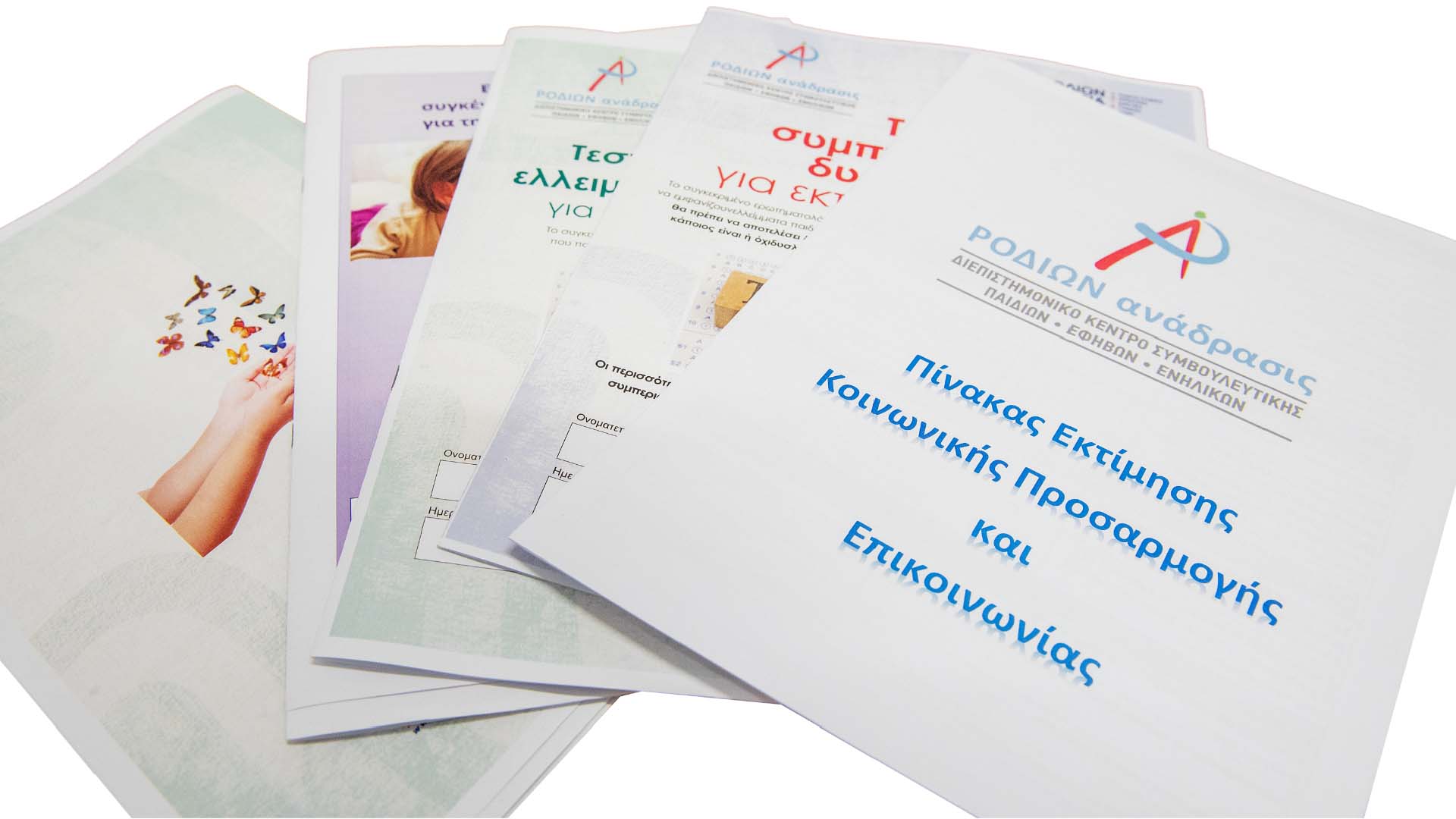



The WISC-V (Wechsler Intelligence Scale for Children Fifth Edition) is the most widely used intelligence assessment scale for children aged 6 years to 16 years and 11 months worldwide. The scale effectively contributes to the diagnosis of learning disabilities, intellectual disability, dyslexia, developmental problems, or school adjustment issues.
The WPPSI-III (Wechsler Preschool and Primary Scale of Intelligence- Third Edition) is an individually administered clinical tool designed to assess the intelligence of children aged 2 years and 6 months to 7 years and 3 months. It is the most commonly used intelligence assessment scale for preschool-aged children worldwide. It is used for a comprehensive assessment of general intelligence and is part of the evaluation for identifying intellectual giftedness, cognitive developmental delays, and learning difficulties. The results provide guidance for placing the child in educational programs.
The "A-Test" is a school readiness assessment designed to determine if a child is academically prepared to enter the first grade and to detect any developmental difficulties that may hinder the child's adjustment to the school environment. The "A-Test" can be administered preventively to all Kindergarten children.
The DTLA is a psychometric criterion-test for identifying intra-individual differences in cognitive functioning. It is used to assess the learning aptitude of students aged 4-16 years and helps in creating educational interventions for various types of learning disabilities.
The psychometric criterion of mathematical aptitude for children and adolescents aged 7 years and 6 months to 15 years and 5 months identifies the potential weaknesses of the student compared to their peers and provides a more specific determination of the student's internal weaknesses and strengths. This allows for the development of specialized intervention programs.
The purpose of the Test-A is to comprehensively assess the reading ability of elementary and middle school students (3rd grade to 3rd year of middle school) and to identify those who face serious reading difficulties during their compulsory education.
With this test, we can diagnose indications of future dyslexia. The Early Dyslexia Detection Test allows us to determine if a preschooler exhibits various difficulties or particularities.
This test is designed to assess the cognitive abilities of children aged 3-16 years but is most effective for children aged 3 to 10 years. It is also used as a tool for personality evaluation and to assess children's awareness of body parts and their relationships to each other. It also evaluates their ability to hold a pencil and control hand movement.
A child can externalize their feelings by drawing a fantasy family, as they will project their true feelings towards the concept of family in their drawing, forming without any guilt or influence what exists and what they would like to exist in their own family.
Drawings of houses, trees, and people provide significant information about the personality structure of the individual being tested, the way they deal with various situations, the defense mechanisms that characterize them, the specific issues they are concerned with, and the internal reserves they possess. The test is primarily used for personality and psychopathology evaluation.
The Raven’s CPM/CVS was designed to provide brief non-verbal and verbal assessments of general intelligence for children aged 4 to 12 years. It offers a comprehensive assessment of intelligence in a significantly short time (average administration time is approximately 15 minutes for each of the two scales). Additionally, as it requires minimal motor activity, it is considered a "fairer" intelligence scale for individuals who are bilingual or come from different socio-cultural backgrounds, children with speech difficulties, hearing impairments, autism, or individuals with severe motor impairments (e.g., muscular dystrophy, cerebral palsy).
The ATHENA Test is a multi-thematic, psychopedagogical diagnostic tool, primarily used for diagnosing learning difficulties. With the Athena Test, it is possible to assess students' strengths or weaknesses and to provide remedial intervention—if necessary—with a specialized recovery program. This test is intended for children aged 5 to 9 years.
Το Κριτήριο Πρώιμης Μαθηματικής Επάρκειας The Utrecht Early Mathematical Competence Test was designed to be used for assessing early mathematical competence in preschool and early primary school children (aged 4 years and 6 months to 7 years and 5 months). Early mathematical competence refers to the set of knowledge and skills that are prerequisites for effectively introducing a preschool or early primary school child to formal education mathematics.
The Λ-α-Τ-ω psychometric criterion (I and II) is a language proficiency test suitable for children and adolescents aged 4-16 years. Its goals are a) to assess the adequacy of the linguistic elements of speech (phonological, morphological, semantic) at the level of reception, organization, and expression, b) to assess the ability to understand and organize spoken and written language, which is connected to the learning process, and c) to highlight special student profiles, so that appropriate programs can be designed for children with learning difficulties.
Software for Detecting Learning Skills and Weaknesses. It is suitable for students from 2nd grade to 8th grade.
The Metaphon Test is a valid and reliable diagnostic tool, nationally standardized, designed to assess the metalinguistic skills of preschool and early primary school children for the detection of difficulties in written language to prevent learning difficulties. The ages of children that can be assessed range from 3 years and 10 months to 7 years.
The C.A.T. (Children’s Apperception Test) and the T.A.T. (Thematic Apperception Test) are among the most well-known and valid projective tests. The T.A.T. is administered to adults, while the C.A.T. is administered to children. Both tests are based on the psychodynamic theory to interpret the stories created by the child or adult, which inform the specialist about the psychological profile. These stories relate to both conscious and subconscious conflicts, the representation of relationships with others, sexuality, anxieties, and body image. They also provide useful differential diagnostic elements that greatly assist in therapeutic planning.
A projective test for expressing the deeper feelings of preschool and early primary school children.
Children's drawings are one of the most important tools used by child psychotherapists and child psychologists to understand and support children. The children's drawings can reveal their fears and anxieties as well as the strengths of their personality. They contribute to the expression, depiction, and externalization of the child's feelings. In the context of a therapeutic process, the drawing is undoubtedly a means for the child to recall thoughts, feelings, experiences, and to solve possible problems.
The Achenbach System of Empirically Based Assessment (ASEBA) is a comprehensive system of tools for assessing the abilities, adaptive functioning, and behavioral and emotional problems in children and adolescents, in a valid and easy manner. It is designed for children aged 6 to 18 years. These tools are applicable in different cultural contexts and in many situations. It includes: a questionnaire for parents (children aged 6-18 years), a questionnaire for teachers (children aged 6-18 years), a questionnaire for adolescents (aged 11-18 years).
The counselors at the Interdisciplinary Center have certified training in alternative supportive communication (social stories, active learning, intensive interaction, etc.). Additionally, specialized scales such as The Child Autism Spectrum Quotient (AQ) for assessing the behavior and personality of children with autism aged 4-11 years, the SCQ, the autism screening questionnaire focusing on social communication, the M-CHAT (Modified Checklist for Autism in Toddlers), and many more specialized tests are administered at our Center.

Ariston Test Customized Skill Assessment with the Signature of Computer Academy
At our Center, we offer the premier experience of Ariston Tests, ensuring a skill assessment using digital tools. Our certified counselors ensure an immediate and effective assessment process. Our students engage in a series of questions designed to reveal their true capabilities with accuracy and objectivity. The process checks the sincerity of responses, thereby ensuring the reliability of the results.
The answers are securely sent to the central computer of the Computer Academy, where they undergo thorough analysis using the most advanced statistical techniques. The multi-page report is delivered to guardians and students by our certified counselors, who provide an extensive analysis of the results and offer detailed instructions for further development and enhancement of the students' skills.

Ariston Kids
This test aims at accurately measuring the unique talents of children to produce very useful conclusions for parents and educators, who will be able to explain the behavior of children and adapt their interactions with them from school or even preschool age.
The test helps parents to identify specific factors of their child's personality, as well as the degree to which these factors characterize and distinguish them. It also helps parents recognize abilities, skills, inclinations, and talents the child possesses and the level at which they are mastered. Additionally, the test contributes to determining the child's potential to exhibit the assessed characteristics in the future and predicts the individual's behavior under various conditions. In general, through this test, the possibility of developmental progress and personality improvement is detected.

Ariston Candidates/Ariston Adults
The ARISTON test is a pioneering experiential Career Guidance system that explores the personality, inclinations, abilities, skills, and interests of each individual. It suggests specific professions that match the examinee's personality, identifies the corresponding departments of the Greek education system, and the degree to which each aligns with the personality factors (primary and secondary).
The ARISTON Candidates test is intended for middle and high school students. Based on the above data, the student can decide on the studies and profession they will follow to ensure a successful career.
The ARISTON Adults test is aimed at adults who wish to improve their personality, discover additional possibilities that they may have but are unaware of, and alternative professions that suit them. More specifically, the test is aimed at students seeking specialization at the postgraduate level, the unemployed seeking alternative work environments, and employees interested in reorienting their career and professional activity in general.

Ariston Learning Styles
This test assesses children's inclinations, their tendencies towards specific work environments, and their learning styles (auditory, visual, verbal, kinesthetic, interpersonal, intrapersonal), which affect the way an individual absorbs knowledge, allowing them to learn faster and more effectively. Specifically, the test results enable a personalized study approach for each student, based on their interests, abilities, and particular ways of receiving and processing information.
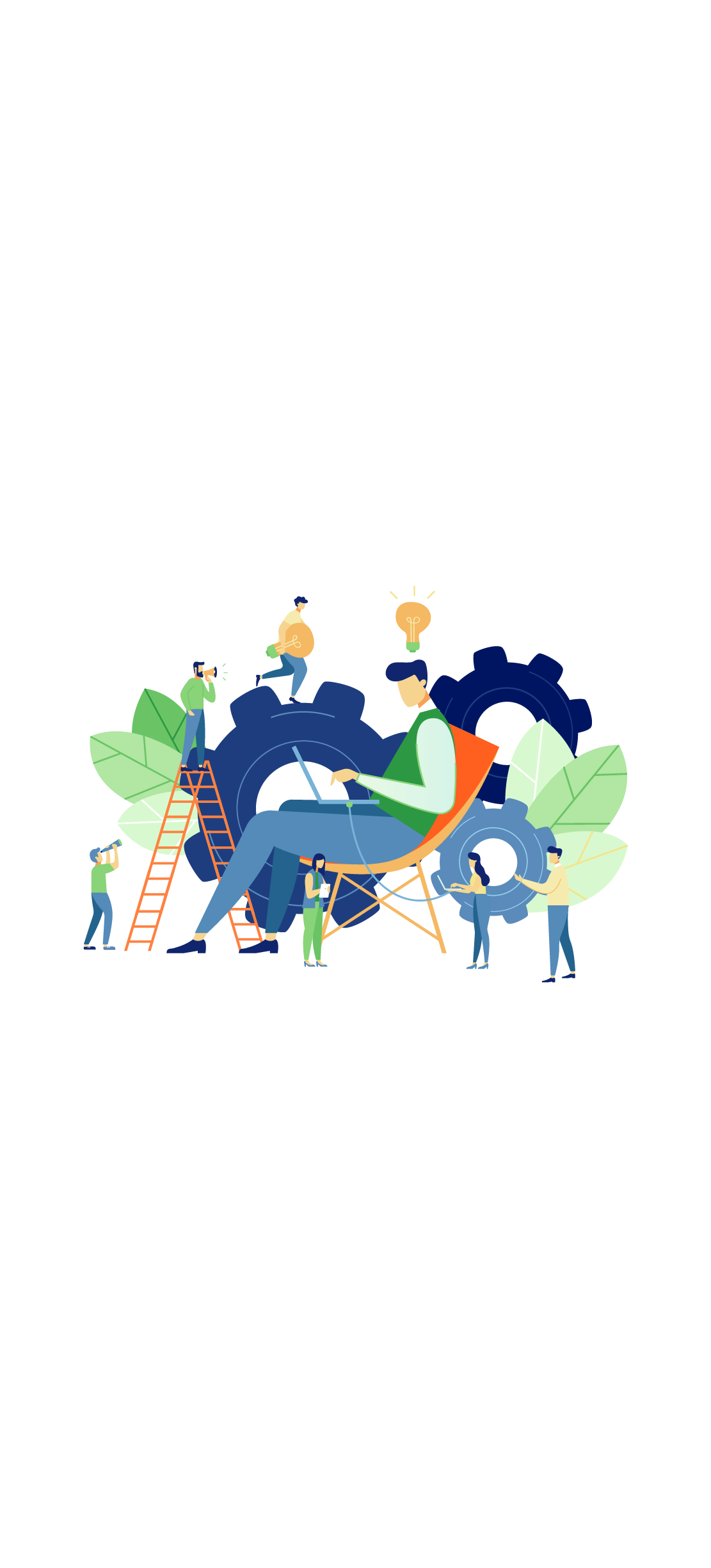
Ariston Recruitment
Ability-skills tests support and make human resource management more effective, as they allow:

